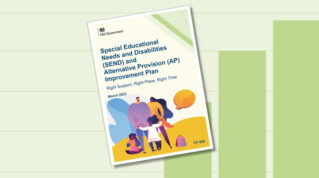Back in 2014, the Government set out a plan to reform SEND support. It was ambitious, and its key goals – introducing a coordinated assessment process, improving collaboration between sectors, and preparing SEND children for their professional futures – were the right ones.
But unfortunately, implementation failures meant that it didn’t work. Despite hundreds of millions of pounds being spent, current SEN provision is not fit for purpose – to his credit, a fact acknowledged by education secretary Nadhim Zahawi in Parliament.
Now, eight years on, the Department for Education has published a new Green Paper – the first step towards untangling the mess. For the most part, it is a welcome one, despite the delays over the past two and half years.
The education select committee, which I chair, held one of the largest-ever parliamentary inquiries into the SEND system in 2019. What we found was grim. The entire system was thick with confusion and bureaucracy, with parents, carers, children, and even those put in place to help them, completely lost.
There was also a vacuum of accountability, with frustrated parents being bounced from organisation to organisation.
Arguably, the most important recommendation in our committee’s report was that the system needs to be simplified. Children were unable to get the most basic support because nobody, often including the people supposed to be administering that support, knew how the system worked.
Done right, this should take a Stanley knife to the red tape tangling up the system
We heard that staff in schools and local authorities did not know the law, published erroneous information on their website, and even gave unlawful advice. All of this meant that parents were in the dark, wading through a treacle of unkind bureaucracy, and children were left without the support they so desperately needed.
Enter the Green Paper’s proposal to “establish a new national SEND and alternative provision system setting nationally consistent standards for how needs are identified and met at every stage of a child’s journey across education, health and care”.
Done right, this should take a Stanley knife to the red tape tangling up the system. The Green Paper’s plans to review and update the SEND Code of Practice and introduce a standardised and digitised Education, Health and Care Plan (EHCP) process should further empower parents and carers to access the right care.
Another major issue our report found is the postcode lottery provision of the quality of support available. With new nationally codified standards, the care you get should no longer depend on how informed, motivated, or well placed the relevant figures in your local authority or school are.
There are also some further measures proposed on accountability. Our committee report found that local authorities, social care, and health providers preferred to shift responsibility, with parents shunted from one to the other, being told: “it’s their job, not mine.”
The only effective recourse was an overloaded tribunal system which, in a concerning 89% of upheld cases, ended up ruling (at least partially) in favour of parents and carers. An accountable system doesn’t boast those numbers.
Read more: The education select committee’s 6 findings to improve a SEND system in crisis
The Green Paper’s proposals to “deliver clarity in roles and responsibilities” and work with Ofsted and the CQC (Care Quality Commission) to update their inspections are, therefore, very welcome.
However, this is also where the Green Paper could do much more. Our report called for an extension of the Local Government and Social Care Ombudsman’s remit. With the authority to go beyond the school gates, the Ombudsman could investigate how well schools provide SEND support, something nobody currently has the power to do.
This could nip SEND deficiencies in the bud, preventing the tribunals system from being overloaded, rendering the system less adversarial and getting children suitable support faster. I hope that in the consultation process, the government includes this provision.
The key recommendation of our report was to provide parents with neutral advocates. In practice this would mean that individuals would support every family to help them navigate the SEN process and ensure they got the right provision for their child.
This would take the onus off the parent’s education, their social capital or the advice and support of people with whom they happen to come into contact. Even with a simplified system, neutral advocates would ensure that a child’s support depends on nothing but their need. This would not be unusual as this type of support exists in the care system.
The government should listen – especially to parents whose voices have traditionally been drowned out – and turn this promising start into concrete action urgently
But, perhaps the biggest unintended problem with this Green Paper has been the delay. The initial, flawed system came into being the best part of eight years ago. The education select committee’s report, which had a wealth of evidence-based recommendations, was finished in 2019, the same year that the Government initially announced the Green Paper.
For almost three years since they have been promised a solution, many families have been locked in a system that denies them the care they need, miring them in an un-just and unfair process that can seem to many, apathetic towards the people it is designed to help.
This Green Paper is a sorely needed solution, but it is only a Green Paper. It is not a White Paper statement of policy, it’s simply a series of proposals put up for further consultation and discussion.
During the next stage of the consultation process, the government should listen – especially to parents whose voices have traditionally been drowned out – and turn this promising start into concrete action urgently.
The primary test for me, and no doubt most other MPs, is that our MP surgeries are no longer full of parents who have children with special educational needs who have been denied a level playing field for their child.
This has been a major social injustice for far too long and it is only right that these children, along with all children, have the same chance to climb the education and skills ladder of opportunity.
















Your thoughts